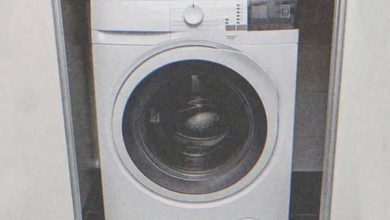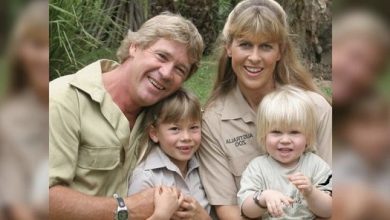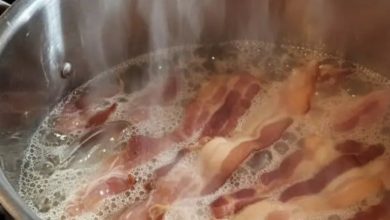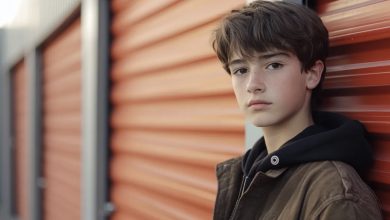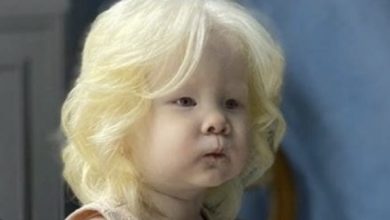We were gathered at the memorial after the sudden loss of my mother and brother when my four-year-old daughter bent toward me and said softly, “The man with the blue tie asked me to give you this.”
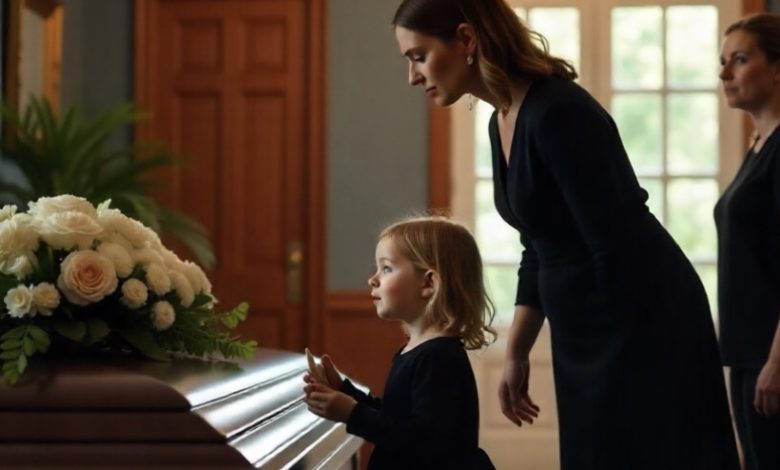
Their loss came like a lightning strike. We were at the service for my mother and my brother when my four-year-old, Maddie—who’s famous in our family for saying unexpected things—leaned to my ear and whispered, “The man with the blue tie told me to give you this.” She pressed a tiny folded paper into my hand. I followed what was written on that note, went to the place it named, and what I found there turned my whole life on its head.
My name is Britney. A year ago I was thirty, a single mom trying to build a safe life out of pieces. My husband had died in a car crash when I was five months pregnant with Maddie. One minute he was kissing my cheek and patting my belly, the next he was gone forever. After that day I moved through the world like I was underwater. The two people who kept me from sinking were my mother, Roslin, and my older brother, Steve. We’d always been close, but grief glued us even tighter together.
When my dad passed away years earlier, Mom raised us alone. Steve was five years older and stepped into the role of helper without being asked. He walked me to school, sat with me at the kitchen table, and learned how to braid my hair because I begged him to. So when I lost my husband, Mom and Steve didn’t even hesitate. “Come home,” they said. “You’re not doing this by yourself.” I moved back into the old house and slept in my childhood room with a growing belly and a heart that felt too heavy.
There was one small wrinkle: Steve’s wife, Sherry. She was three years younger than he was, polite and cool, the kind of person you couldn’t quite read. I didn’t know what living under the same roof would feel like for her. To my surprise, she agreed quickly. “Of course,” she said. “Family is family.” I wanted to believe her.
Maddie was born strong and healthy. We had picked her name before my husband died, and saying it out loud—the name he chose with me—gave me courage. Nights were long, but Mom rocked the baby so I could sleep, and Steve picked up diapers and tiny socks like it was the most important task in the world. Steve and Sherry could not have children, and he poured all his spare love into my little girl. He took Maddie for walks, showed up with stuffed animals, and told me to go out for an hour so I could remember I was more than my grief. “I’ve got her,” he said. “Go breathe.”
When Maddie turned four, something new began. She started chatting with an empty chair, or turning her head to the side like she was listening to someone I couldn’t see. She would pause, nod, and then repeat what “someone” had told her. Mom and Steve called it an imaginary friend and thought it was adorable. Sherry did not. She stiffened when Maddie’s “conversations” started. Once, when my daughter touched a scarf that belonged to her, Sherry snapped, “Don’t touch my things,” like Maddie was a thief. Another time she muttered, not quite under her breath, “That child needs an exorcist.” I wanted to defend my kid. I also didn’t want to explode our fragile household. I swallowed my words and carried on.
Life grew steady. I found an office job that paid the bills, and Maddie started preschool. My late husband had left an inheritance that kept a cushion under us, but I was determined to depend on my own work too. We did our mornings, our lunches, our bedtime stories. Then, on a holiday weekend, the ground under us shifted.
“Let’s take a little outing,” Steve suggested. “Just you, me, and Maddie.” Usually he offered to take Maddie alone so I could rest, so his plan felt special. We went to a department store, and he bought Maddie a small stuffed cat. She hugged it like it was a living thing. Later, at a coffee shop, Steve’s smile faded. “Britney,” he said, looking straight at me, “if anything ever happens to me, I need you to pay close attention to Maddie. To what she says. Especially about her… friend.” His voice shook a little on the last word.
“What are you talking about?” I asked, half-laughing because the idea was so strange coming out of his mouth.
“I’m serious,” he said. “Promise me.”
I promised, but I didn’t push for details. The very next day my mother pulled me aside in the kitchen. “Are you noticing anything odd?” she asked. “People acting strangely? Anything at all?” When I asked her why, she shook her head. “Just… be aware.” I told myself they were both overprotective because of what we had already lost. I told myself life was fine.
Days later my phone buzzed while I was picking up Maddie from daycare. It was Sherry, crying so hard she could barely speak. “Britney,” she said, “the police called. Your mom and Steve were in an accident. They didn’t make it.” The words slid into my ear like ice. It was the same empty sound I heard when I was told my husband was gone.
At the hospital they lay side by side, faces pale, bodies still. “Are Grandma and Uncle Steve sleeping?” Maddie asked, her small voice bright in the sterile room. I pulled her close and sobbed until my throat burned.
We planned the funeral. I moved through those days like a robot in a black dress, nodding, signing papers, answering questions I couldn’t really hear. The service was crowded. People hugged me, said they were sorry, pressed warm hands around my cold ones. Sherry stood next to me for a while, crying in a careful way. She stayed far from Maddie, like my child carried sparks. Halfway through the service she whispered that she felt sick and slipped out. I didn’t think much of it. Grief shows up strange.
That was when I saw Maddie tiptoe toward Steve’s casket with her stuffed cat tucked under her arm. “Maddie, no, honey,” I whispered, moving quickly, heart pounding. “We don’t touch. We’re here to say goodbye.” She pointed past me to a chair draped in black fabric. No one was sitting there.
“The man with the blue tie wants me to give you this,” she said, holding up a folded piece of paper.
The blue tie. My husband’s tie. The one I had wrapped in tissue for our last anniversary, the one he wore on the morning he died. The blood in my body seemed to stop and then start again somewhere else.
I took the paper. Inside was Steve’s rushed, slanted handwriting. The first line said that all of my late husband’s inheritance was supposed to go to Maddie. That confused me; we had already made a plan for her future. But the next lines burned like fire.
Britney, Sherry is not who you think. She’s going after your husband’s money. She made a deal with dangerous people to get you out of the way. Mom and I found out and confronted her. This wasn’t an accident. I think she changed the target.
I didn’t act calm or careful. I grabbed my child and ran. We didn’t walk out of a funeral; we fled a crime scene. Somewhere inside that building a woman had tried to erase me from my daughter’s life. The note in my hand said my mother and my brother were dead because they stood in her way.
Once we were in the car with the doors locked, I called Sherry’s workplace and told the manager to freeze her access to every account she touched. I didn’t share the whole story; I just said something bad was happening and they needed to act. They did. A second call went to the police. The officers took my statement and promised to send someone right away.
By the time the police reached our house, Sherry had disappeared. Her things were in the closet. Her phone went straight to voicemail. It didn’t take long for the first pieces to fall into place. Sherry had debts—big ones. She had poked around in my husband’s estate more than once, asking questions that made no sense for someone outside the family. And there were traces of messages to people none of us knew, people whose usernames sounded like shadows. The detectives believed Steve’s note. So did I. The crash that killed my mother and my brother had not been bad luck. It had been a plan.
The picture the police built looked like this: Sherry had become obsessed with the money my husband left behind, the money meant for Maddie’s future. She had reached out to the wrong kind of people and arranged for something to happen to me so that the money would land where she could get it. Mom and Steve discovered what she was doing and tried to stop her. She panicked. The “accident” came early and hit them instead. Steve, realizing what might come next, wrote a warning, hid it in his pocket, and hoped someone—maybe Maddie’s “friend”—would get it to me. Sherry, thinking she could still cover her tracks, tried to get rid of that paper by slipping it into the casket. She assumed it would be cremated with him. It almost was.
Grief is heavy. Rage is bright. I carried both. I wanted justice, and I wanted to hold my baby and hide. I could hear my mother’s voice in my head: Be strong for your child. So I did what I could do. I talked to the police. I gave them every scrap of detail—Sherry’s temper, her cold looks at Maddie, the day Steve asked me to listen to my daughter. I prayed. I checked the windows twice every night. I kept Maddie close.
People drifted away, as they do when sorrow lasts longer than their comfort. A few friends stayed. My boss told me to take the time I needed. Neighbors brought casseroles. I smiled and said thank you and tucked food into a crowded fridge. The house felt too quiet even with cartoons playing and pots clattering in the sink.
One afternoon, a few days after the funeral, I drove Maddie to the cemetery where my husband was buried. The air smelled like cut grass. I laid a handful of his favorite flowers on the stone and, because I wanted to do something that felt like him, I set down a hamburger from the diner he loved. He had always joked that if there was an afterlife, it ought to have fries.
I closed my eyes and told him I was tired, that I missed him, that I didn’t know how to keep going but I would try for our girl. While I whispered, Maddie nibbled a corner of the burger. Then she said, very matter-of-fact, “It’s delicious. Daddy says it’s good, too.”
I opened my eyes. “What did you say?”
“Daddy says the hamburger is good,” she repeated, like I hadn’t heard her the first time. “The man with the blue tie was Daddy. When you were praying, he was eating with me.”
Something inside me loosened and warmed. I laughed—a real, surprised laugh that didn’t hurt. Of course my husband would show up for a hamburger. Of course he would sit next to his daughter and steal bites. The thought was silly and holy at the same time. Maybe grief and comfort could live in the same moment.
I told the headstone what I told the air: “Every week, I’ll bring you a hamburger. Maddie and I will eat with you.” And we did. We still do.
The police never stopped looking for Sherry. Word came that she’d tried to move money that wasn’t hers and had been blocked. After that she stayed in the dark, probably running from the law and from the very people she had paid to do her dirty work. I do not know where she is. I do know she will never stand in our doorway again.
Sometimes I replay the strangest parts. Steve’s sudden seriousness at the coffee shop. Mom’s careful question in the kitchen. The chair draped in black fabric at the service. Maddie’s small voice saying “the man with the blue tie.” My husband had loved that tie. It was the neat, bright thread that tugged the whole truth out of hiding. Maybe it was all coincidence. Maybe a mother’s mind will grab any rope that keeps her heart from sinking. But when I watch my daughter smile at empty air, and when I see her pause to listen like someone is speaking just behind my left shoulder, I feel less alone.
We go on. I work. I make lunches. I read bedtime stories where good people find the strength they didn’t know they had. Maddie talks less now to the empty chair, but sometimes she giggles and says, “Daddy tells funny jokes,” and I say, “He always did.” On Sundays we stop by the cemetery with flowers and a paper bag that smells like grilled onions. We sit on the grass and tell him the week’s stories. The wind moves through the leaves like a small applause.
I keep Steve’s note in a sealed plastic sleeve in the bottom of a box with other important papers. I’ve read it so many times I could write it from memory, but I never will. It was his last gift to me—proof that love pays attention, even when it’s afraid. Mom and Steve lost their lives because they were brave enough to speak. I am raising Maddie to be brave the same way: to tell the truth, to listen to the quiet things, and to trust the voice that says “go now” when the world tries to hush you.
We are a family of three: a mother, a daughter, and a guardian who wears a blue tie and eats hamburgers in the sunshine. The ache is still there, but it no longer swallows the day. It sits beside the love, and the love is bigger. My mother and my brother did not die for nothing. Their warning reached me through a child’s words and a folded piece of paper. It was enough to save us.
I don’t know what tomorrow will bring. I do know this: when my little girl leans toward a shadow and smiles, I will lean with her. I will listen. Because once, when our lives were breaking, listening to Maddie—and to the man with the blue tie—changed everything.



